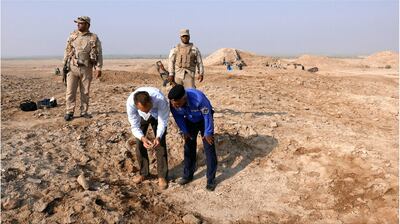Britain will return to Iraq an ancient sculpture that was smuggled out of the country before being offered for sale.
The Sumerian temple plaque, dating from about 4,400 years ago, was seized by police after curators at the British Museum noticed the artefact on an auction website last year.
It is thought to have been looted in the past 30 years from the Sumerian heartland in what is now southern Iraq.
British Museum senior curator Dr St John Simpson said the artefact was extremely rare.
"We're used to coming across tablets, pots, metalwork, seals and figurines on the art market or in seizures that have been trafficked. But it's really exceptional to see something of this quality," he told the Guardian.
“There are only about 50 examples of these known from ancient Mesopotamia. So that immediately places it on the high rarity scale. We can be fairly sure that this object comes from the Sumerian heartland.
“That is the area that got very badly looted between the 1990s and 2003.”
The plaque was offered for sale as a “western Asiatic Akkadian tablet” in May 2019 by online auctioneer Timeline Auctions.
It was a votive wall plaque from an ancient Sumerian temple on the site of modern-day Tello.
The limestone artefact depicts a large seated male figure, probably a high priest or ruler, in a Sumerian skirt.
The Sumerians were an ancient people who lived during the early Bronze Age.
The artefact would probably fetch tens of thousands of dollars if sold on a legitimate market.
Christopher Wren of TimeLine Auctions said: “The piece is not documented as having been looted and is not listed on any database, so it did not show on the checks with the Art Loss Register and other sources undertaken by us.
“The vendor, who had casually and innocently acquired it from a German arts fair some years ago, was horrified to hear this and immediately volunteered to renounce any claim to ownership and expressed the wish that it be returned to its place of origin.”
The sculpture will be displayed at the British Museum for two months before it is returned to Iraq.
Last July, the museum oversaw the repatriation of more than 150 looted ancient artefacts recovered by authorities to institutions in Iraq and Afghanistan.


